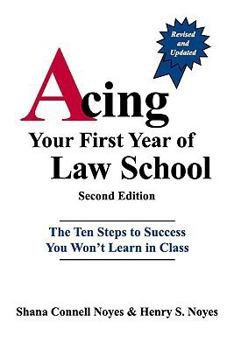Acing Your First Year of Law School: The Ten Steps to Success You Won't Learn in Class
Select Format
Select Condition 
Book Overview
Provides advice for first year law students on a variety of issues to help them avoid the pitfalls that are common amongst first year students. THIS BOOK IS PART OF OUR STUDENT SURVIVAL PACK...6 books... This description may be from another edition of this product.
Format:Paperback
Language:English
ISBN:0837714109
ISBN13:9780837714103
Release Date:May 2008
Publisher:William S. Hein & Company
Length:150 Pages
Weight:0.55 lbs.
Dimensions:0.3" x 6.0" x 9.1"
Customer Reviews
5 ratings
What to study and what to skip
Published by Thriftbooks.com User , 20 years ago
This book teaches you what you need to focus on in your first year of law school, but even better, it points out all the things you should ignore. For example, the author recommends using electronic databases to cross-reference topics for legal research and warns how counter-productive it is to wander through a legal library without first using the databases to narrow your search. The subjects are thoroughly covered and at the end of each chapter there is a "Dicta" column that sums up all the things that rookies waste time trying to learn. It's a heck of a value and a good guide for your first year preparations.
Avoid Commercial Outlines and Study Groups
Published by Thriftbooks.com User , 21 years ago
Having graduated with high honors from one of the top five law schools, I can attest to the book's straight-forward approach to law school exams. I applied the book's approach as follows: (1) read only those assignments provided by the professor (ignore commercial outlines, etc.); (2) take extensive notes of everything the professor says in class (and do not write down any student comments or student answers to Socratic questions); (3) organize your notes of the professor's lectures into your own outline; (4) read the professor's prior exam files, including any student answers selected by the professor as "model answers"; and (5) practice taking the professor's old exams in the few days leading up to exam day. The rationale is that your professor will be looking for you to spot those issues that he or she views as important. The more of these issues you spot, the higher your exam grade will be. Ditch those commercial outlines and study group meetings. In addition to Acing Your First Year of Law School, you should also prepare for law school by conditioning yourself to what its competition will feel like. Two excellent books that accomplish this are Scott Turow's One L (Harvard in the 1970s) and Scott Gaille's The Law Review (2002 book about competition at The University of Chicago Law School). Good luck!
Prelude to Success
Published by Thriftbooks.com User , 23 years ago
Shana and Henry Noyes capture the essence of the difficulties that face a first year law student. They've managed to boil down what can be an incredibly intimidating experience into ten easy to read chapters. Students beginning law school should not underestimate the value of being well prepared for their first day of class. High grades received in the first year can catapult a student to a prestigious judicial clerkship or a summer associate position at a well respected law firm. Students who read this book will have a tremendous advantage over others who are not so fortunate. This is a must read for all first years!
It's Really Very Simple
Published by Thriftbooks.com User , 23 years ago
When one wonders at the brilliance of a virtuoso pianist, for example, it is very easy to forget that she got to that point by breaking complex pieces down into smaller and smaller pieces and then practicing them until she could perform them exceptionally well. It turns out that it's the same thing with acing the first year of law school, according to Shana and Henry Noyes.In deceptively simple prose, the Noyeses break down the "first year" experience into its basics: how to read a case, how to brief a case, cite cases, do research, etc. Certainly as important as what they point out as important (which they do with exceptional clarity), is what they point out is a waste of time (the "dicta" at the back of each chapter). Things like recopying notes - a waste of time, they note, that could be put to better use by actually thinking about what went on in that class. (Thinking, they argue, is avoided at all costs by some "first years" who will find anything to keep them busy.)Some of the strongest chapters are on legal writing - how to organize papers, the conventions of legal writing, what research is necessary and what isn't, and navigating the arcana of legal citations (don't worry about most of the rules until you make Law Review). And capping it off is a modestly offered example of how to write an Outline: their outline of criminal law is a model of elegant simplicity. (These two are good.)This book came out too late to help most of the first year Class of 2000. Not too late for the son a friend, who purchased it a week before his final exams, and thought it a great investment. Just think how he could have performed if he had this book on the first day.
Required reading for law school
Published by Thriftbooks.com User , 24 years ago
This book should be required reading for every first year law student. It contains the advice needed to succeed in law school's most important year.The steps to success are clear; a disciplined law student will easily be able to implement them.




